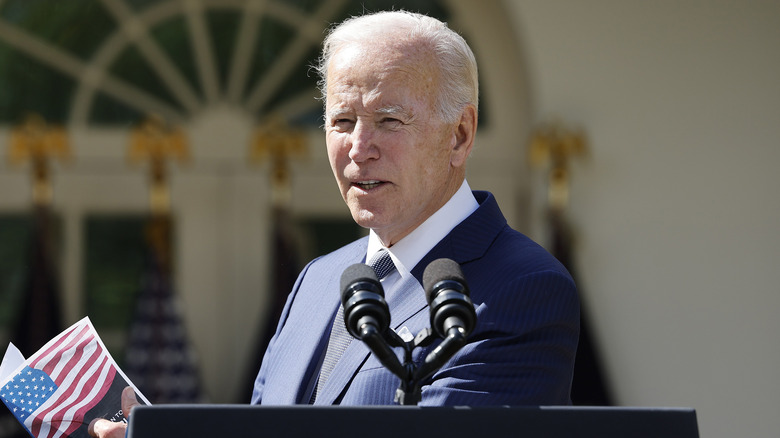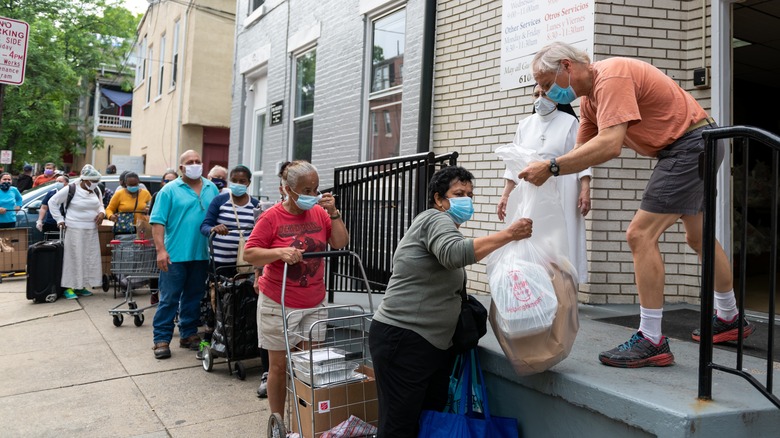How The White House Plans To End Hunger By 2030
The late Senator Bob Dole (R-KS) was known as a decorated World War II veteran who reached across the aisle to pass important pieces of legislation. And while he is rightly remembered for his work on the landmark Americans With Disabilities Act, per The New York Times, Dole should also be remembered for the bipartisan effort he undertook with fellow Senator George McGovern (D-SD) to reform America's food and nutrition system in the 1970s — an effort that resulted in a stronger Food Stamp Program (or what is known today as SNAP); the Women's Infants and Children's Program (WIC); reformed School Lunch and Breakfast Programs; and the McGovern-Dole Food for Education and Child Nutrition Program, per OFW Law.
It was because of Dole, McGovern, and their work on the Select Committee On Nutrition and Human Needs that the groundwork was laid for the first-ever White House Conference on Food, Nutrition and Health, which took place in 1969 under the presidency of Richard Nixon and, per Tufts, was aimed to "put an end to hunger in America for all time."
More than five decades after that first summit, the Biden Administration is convening a White House Conference on Hunger, Nutrition and Health, meant to set a national strategy to end hunger in America by 2030.
The White House has identified five goals involving food and nutrition
The conference, which is scheduled to convene on September 28, is looking to find policy-oriented solutions that will address issues related to food and nutrition, from methods to end hunger to improving how Americans eat and engage in physical activity, per NPR. In a statement, President Joe Biden also tied the coronavirus pandemic to nutrition, as he called the event "a stark reminder of the need for urgent, sustained action. As more Americans experienced hunger, we saw diet related diseases heighten the risk of severe COVID," the president said, adding that "it's time we committed to real change."
The White House is going into the conference after identifying five action items that need to be addressed: improving food access to all Americans regardless of ethnicity or socio-economic group; making nutrition and food security a priority; creating and sustaining ecosystems that will allow Americans to make healthy food choices; encouraging more movement and physical activity; and improving nutrition and food security research.
NPR says the White House formulated these pillars after consulting with different federal agencies and conservation, education, environmental, hunger, and nutrition groups. The conference comes at a time when many Americans are struggling with record inflation levels that are impacting their food choices, chronic health issues like obesity (which is triggered by low-quality food), and food insecurity — 10% of Americans don't know where their next meal will come from, which translates to millions of households, per the USDA.
There are concerns over how much the conference can achieve
Even before the meeting convenes, there are already fears that the Biden-Harris hunger conference won't achieve as much as the Nixon conference did back in 1969. Tufts University professor of nutrition Dariush Mozaffarian, who worked with World Central Kitchen co-founder José Andrés, told Politico that the real work wasn't in planning the conference, but in affecting what happens after. "The critical question is: Is there going to be continued passion and commitment to actually implement the [White House] plan?" he said. Many parts of the plan will require working with Congress to get the job done, and as Politico points out, there is still uncertainty over which party will hold the majority when the next session begins.
Still, there is a chance that Congress will get together to enact the overhauls that the American food and nutrition system so badly needs. Bipartisan support was already seen at the beginning of the year, when House and Senate representatives Jim McGovern (D-MA) and the late Jackie Walorski (R-IN); as well as Sens. Cory Booker (D-N.J.) and Mike Braun (R-IN) got together to find the $2.5 million that the White House needed to pull the event off, per NPR.


